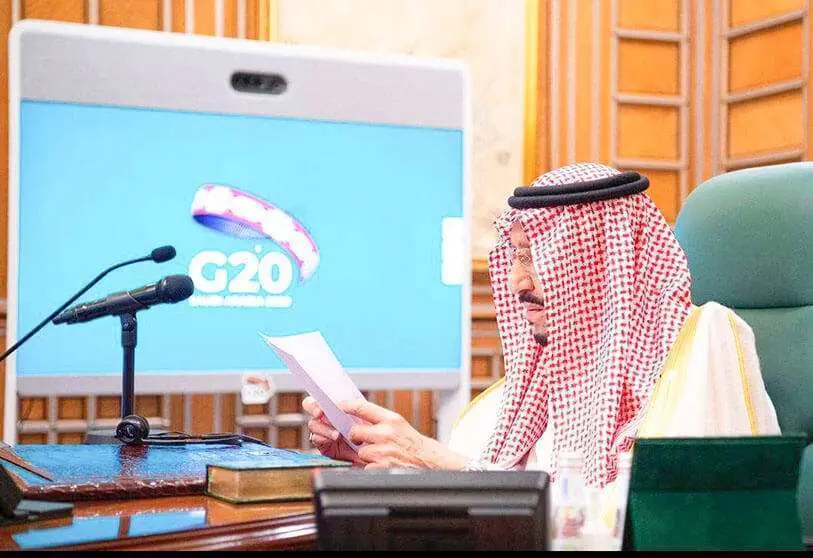G20 sets stage for economic recovery from the impact of the COVID-19 crisis

Next November, the next G20 summit will take place, hosted by Saudi Arabia. On 20 and 21 Riyadh will be the scene of the meeting of the leaders of the 20 most industrialized economies in the world. As a prelude, a virtual meeting of the finance ministers and central bank governors of these countries was held this Saturday under the auspices of Mohammed al-Khaddan, the finance minister of the Saudi kingdom, and Ahmed al-Kholifey, the governor of the Monetary Authority of the country on the Arabian peninsula.
In this Saturday's meeting, the main lines to be followed by the most industrialized countries to face the economic recession originated by the standstill derived from the coronavirus pandemic have been shown. It has been pointed out that global economic activity is expected to contract sharply in 2020 due to the impact of the COVID-19 health crisis and related supply and demand shocks. While the outlook remains highly uncertain and subject to high downside risks, global economic activity is expected to recover as economies gradually reopen and the effects of implemented policy measures materialize.
The G20 has called for continued use of all available policy tools to safeguard people's lives, jobs and incomes, support global economic recovery and improve the resilience of the financial system.
Immediate and exceptional guidelines are now being adopted to address the COVID-19 pandemic and its interlinked effects on health, society and the economy, including through the implementation of unprecedented fiscal, monetary and financial stability measures, while ensuring that international financial institutions and relevant international organizations can provide decisive support to emerging, developing and low-income countries.
The G20's position is to foster cooperation to get out of this situation: "Working together, we will continue and strengthen, as necessary, these efforts to support a rapid and robust recovery to achieve strong, sustainable, balanced and inclusive growth, making full use of the current transformations in the shape of the recovery, consistent with our pre-crisis agenda. Fiscal and monetary policies will continue to operate in a complementary manner for as long as needed. Monetary policy continues to support economic activity and ensure price stability, in line with the mandates of Central Banks. We will continue to facilitate international trade and investment and build the resilience of supply chains to support growth, productivity, innovation, job creation and development. We will continue to take joint action to strengthen international cooperation and frameworks.
The G20 Action Plan, adopted at the last meeting on 15 April 2020, sets out the key principles that guide the response and commitments to take concrete actions to boost international economic cooperation in the midst of this crisis, all in view of a strong, sustained and inclusive global economic recovery.
The recent meeting has noted substantive progress in the implementation of the G-20 Action Plan, which provides information on the follow-up to the commitments of the Action Plan, including progress made and the way forward to support global economic recovery, while enhancing resilience to future shocks, including pandemics, natural disasters and environmental risks.
It has also been noted that the G20 Action Plan is a document that will make it possible to respond promptly to health and economic developments. Recognizing that members are at different stages in responding to the crisis and that the global economic outlook continues to evolve, further action is needed.
The third pillar of the G20 Action Plan - returning to strong, sustainable, balanced and inclusive growth once the restraints are lifted - provides the basis for cooperation in support of global economic recovery. Building on previous commitments and taking into account the discussions at the next joint meeting of G20 Finance and Health Ministers, the relevant working groups have been tasked with developing an updated G20 Action Plan to be presented to the October 2020 meeting, prior to the November 2020 G20 Heads of State Summit.
The COVID-19 pandemic has reinforced the need to improve access to opportunities for all and the intention of the G20 to reduce inequalities has been made clear, reaffirming previous commitments to promote inclusive growth. Emphasis will also be placed on limiting the disproportionate impact of the crisis on the most vulnerable sectors of society.
In this context, the G20 seeks to improve access to opportunities for all as a valuable set of policy options that can be harnessed to support the immediate response to the COVID-19 pandemic and move towards a strong, sustainable, balanced and inclusive recovery.
The progress made under the Debt Service Suspension Initiative (DSSI) had been welcomed. As of 18 July 2020, 42 countries had applied to benefit from DSSI, representing an estimated $5.3 billion of Debt Service for 2020 to be deferred. The International Monetary Fund (IMF) and the World Bank Group (WBG) have proposed a fiscal surveillance framework and process to strengthen the quality and consistency of debt data and improve debt disclosure. In order to provide maximum support to countries eligible for DSSI, implementation will continue to be closely coordinated.
All official bilateral creditors should implement this initiative in a full and transparent manner. In addition, the multilateral development banks (MDBs), while protecting their existing ratings and the low cost of funding, are encouraged to continue their collective efforts to support the DSSI, including by providing eligible countries with net positive financial flows during the period of the suspension of the DSSI, as well as further details on new funding provided to each eligible country.
Support has also been given to the Institute of International Finance (IIF) guideline for voluntary private sector participation; taking into account the need to make further progress and encouraging private creditors to participate in the DSSI on comparable terms when requested by eligible countries.









